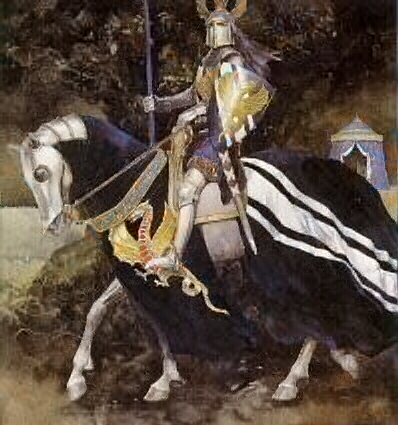

In this passage taken from Sir Gawain and the Green Knight Lines 1623-1718, the reader sees how Sir Gawain is the hero of the poem, through the tests of the host. Sir Gawain is speaking to the host of the castle where he is staying for a few days before journeying on to the Green Chapel. The host has just returned from hunting and killing some boar. While the host is out hunting for the boar, we learn that Sir Gawain is developing a love interest in a special lady friend, the wife of the host, who makes several attempts to seduce him. Before this hunt, Gawain and the host make a promise to each other that they will exchange whatever they may win that day for the other's winnings. The host gives Sir Gawain the boar in exchange for two kisses. Then the host says to Sir Gawain "Now we are even" (Norton, 236, line 1641.) There is a vivid description of the meal that follows, as well as the singing of Christmas songs. Then Gawain tells the host that he should be on his way to the Green Chapel to face the Green Knight. The host comments on the fact that he has tested Gawain twice and is quite impressed with his performance. The host then tells Gawain about the third test. In the test, the winner will take all, and the loser takes nothing. Gawain thinks this is all just a game and doesn't realize that it is actually a test. Sir Gawain later decides that he will stay, after learning from the host that the Green Chapel is not too far away from the castle. He has some more drinks with the host. After this, he goes to bed and gets the best night's rest, and is up early the next morning. That morning, the host hunts for some fox as Gawain lies in bed. The passage ends with a description of how the host and his dogs capture and kill the fox, after the fox tries to trick the pursuers.
A special instance in this passage that strikes me is the exchange of the kisses for the boar. Do the kisses symbolize a feeling of affection between Gawain and the host, or is this just done because they have made a promise to each other? Although it is never really made clear in the text, I feel that the kisses are exchanged because of the agreement that they made between each other. Another scene in the passage that is striking is the flurtation between Gawain and the host's wife. "And ever our gallant knight beside the gay lady; So uncommonly kind and complaisant was she; With sweet stolen glances, that stirred his stout heart; That he was at his wits' end, and wondrous vexed" (Norton, 236, lines 1657-1660.) I found this scene to be quite humorous, and I am also able to see Gawain falling for her each time she comes to visit him. The scene adds a little flavor to the passage, even though it is another concealed test in Gawain's journey to the Green Knight's chapel.
The language used in this passage shows that both the host and Gawain are not afraid of anything. The is shown in the section of the passage where the host returns from killing the boar "Of the battle of the boar they beset in the wood; The other man meetly commended his deeds; And praised well the prize of his princely sport" (Norton, 235-236, lines 1628-1630.) This is also shown in the section of the passage where the host tells Gawain how he has tested him twice and will be testing him a third time: "For I have tested you twice, and true have I found you; Now think this tomorrow: the third pays for all" (Norton, 236-237, lines 1679-1680.)
This passage relates to the entire poem in that it gives the reader a sense of how brave and courageous Gawain, the hero of the poem, really is. Although it seems to be a sidetrack from the main theme of the story, which is the battle between Gawain and the Green Knight, the reader is able to see the brave Gawain while performing the tests that the host later informs him of. His bravery is also shown at the beginning of the poem, when he agrees to take on the challenge of the Green Knight. It is also evident when he cuts off the head of the Knight, sending it rolling across the room. At the end of the story, the reader sees Gawain face the Knight once again, at his chapel. His bravery is shown in facing the Knight as he has promised. He even suffers a wound to his neck. But, that does not stop him. He points out to the Green Knight that he is not immortal as the Green Knight is. The wound in his neck shows this. Unlike the Green Knight, Sir Gawain cannot just put his head back on his head. This also shows that he is a hero. He is not a "superman" like the Green Knight appears to be. He can die, and he still risks his life in fighting the Green Knight.
In conclusion, this passage taken from Sir Gawain and the Green Knight shows the reader how brave Sir Gawain really is. Here, the reader sees that Gawain is ready and able to face any challenge and obstacle that cross his path. Rather, he approaches these challenges and obstacles with the utmost bravery that a true hero can have.
Quotations from: Abrams, M. H. The Norton Anthology of English Literature. New York: W.W. Norton & Company, Inc., 1993.